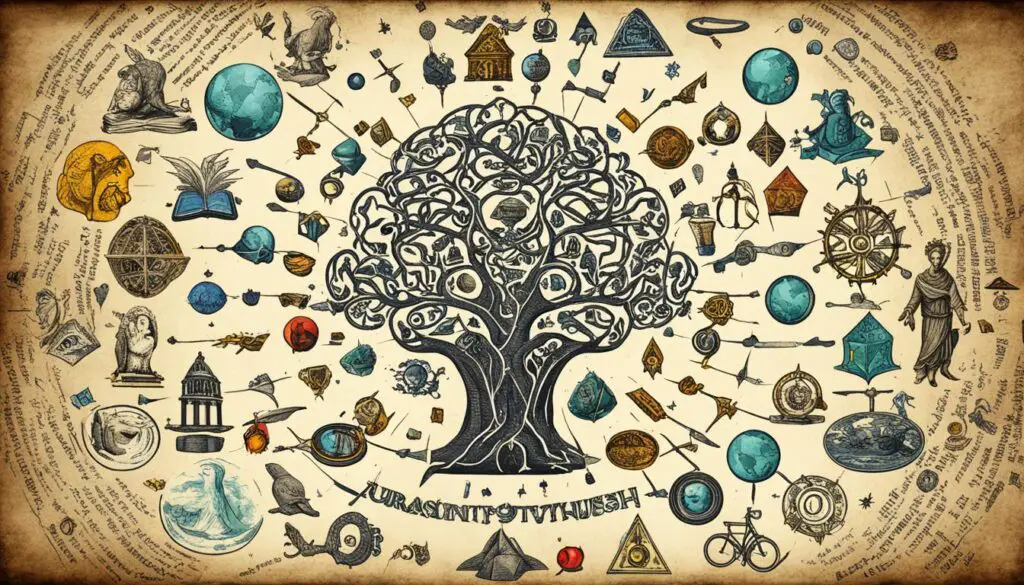For the first time, Unicamp will have specific Philosophy and Sociology questions in its entrance exam. The subjects will be inserted in a current historical, cultural and social context. It is important to understand that the inclusion of these subjects does not make the test more difficult, but requires a critical understanding of the world and scientific thinking. The questions can address philosophical and sociological concepts applied to everyday situations.
Main points to be considered:
- Get to know Philosophy content which will be covered in the entrance exam
- Understand the relationship between Philosophy and other fields of study
- Realize revisions e issue resolution previous
- Study the philosophers most charged in the test
- Have knowledge about current affairs and their relationship with Philosophy
Characteristics of the Philosophy and Sociology subjects in the Unicamp entrance exam
The disciplines of Philosophy e Sociology No. Unicamp entrance exam have unique characteristics that make them important in the test. However, these subjects do not make the test more difficult. In fact, they complement the proposal of a contextualized test, which seeks to assess not only theoretical knowledge, but also the candidate's ability to apply philosophical and sociological concepts in everyday situations.
Sociology is a modern science that studies social transformations and the relationships between individuals and society. It offers a critical view of the world, analyzing social, political and cultural issues. Philosophy is the basis for all knowledge, providing a deep reflection on the nature of reality, the meaning of life, the ethics and other fundamental aspects of the human being.
The Philosophy and Sociology in the entrance exam Unicamp expects the candidate to have an in-depth understanding of these disciplines and know how to apply the concepts studied in practical situations. In this sense, it is important to study not only the theoretical contents, but also to be up to date with the philosophical and sociological discussions present in contemporary society.
Philosophy in the Unicamp Entrance Exam
In the Philosophy test, it is common to find questions involving the interpretation and analysis of philosophical texts, as well as reflection on ethical, political, aesthetic and epistemological themes. Furthermore, the test can address historical aspects of Philosophy, such as the main currents and philosophers, both from ancient philosophy, such as Socrates, Plato and Aristotle, as well as modern philosophy and contemporary.
Sociology in the Unicamp Entrance Exam
A Sociology in the entrance exam from Unicamp seeks to assess the candidate's ability to understand social issues and apply sociological concepts in the analysis of contemporary phenomena. It is important to have knowledge about the classic thinkers of sociology, such as Karl Marx, Max Weber and Émile Durkheim, and understand the main sociological theories, such as conflict theory, functionalist theory and interactionist theory.
| Features | Philosophy in the Unicamp Entrance Exam | Sociology in the Unicamp Entrance Exam |
|---|---|---|
| Objective | Assess the ability for reflection and critical analysis | Assess understanding of social transformations |
| Board | Ethical, political, aesthetic and epistemological themes | Social, political and cultural issues |
| Thinkers | Ancient philosophy, modern and contemporary | Classical thinkers and sociological theories |
When studying Philosophy and Sociology for the Unicamp entrance exam, it is recommended to read the original texts of philosophers and sociologists, in addition to carrying out exercises and previous tests to familiarize yourself with the style of the questions. It is also important to be up to date with contemporary debates and have a critical view of society and the world around you.

Interdisciplinarity in the Unicamp entrance exam
O Unicamp entrance exam stands out for its interdisciplinary approach, establishing connections between different areas of knowledge. In the context of the disciplines of Philosophy and Sociology, this interdisciplinarity manifests itself through close relationships with other disciplines, such as History and Geography.
When studying Philosophy in the entrance exam, it is important to understand the relationship between this discipline and History, as many questions can address philosophical concepts applied to specific historical contexts. Likewise, to understand Sociology in the entrance exam, it is essential to establish the relationship between this discipline and Geography, since social transformations are often closely linked to geographic spaces.
By having solid knowledge of related disciplines, Unicamp entrance exam candidates will have a more in-depth understanding of the questions proposed and will be able to analyze the context more broadly. This ability to relate different fields of knowledge is valued by the university, as it reflects students' ability to apply learning in an interdisciplinary way.
Example of the Relationship between Philosophy and History:
“Understanding Aristotle’s thought is fundamental to understanding the conception of politics in Ancient Greece. His ideas about human nature and the common good had a strong influence on the way Greek society was organized politically. When studying Philosophy in the entrance exam, it is essential to establish this relationship between philosophical thought and the historical context in which it developed.”
Example of Relationship between Sociology and Geography:
“The study of the relationship between work and geographic space is one of the central aspects of Sociology applied to Geography. Understanding how social transformations affect the occupation of territories and production dynamics is fundamental to analyzing socio-spatial inequalities. In the Unicamp entrance exam, questions that require this broader understanding are frequent.”
| Discipline | Interdisciplinary Relationship |
|---|---|
| Philosophy | Relationship with History |
| Sociology | Relationship with Geography |
The table presents the relationship between the disciplines of Philosophy and Sociology with other areas of knowledge in the context of the Unicamp entrance exam.
Therefore, when preparing for the Unicamp entrance exam, it is important not only to study the disciplines of Philosophy and Sociology themselves, but also to understand how these disciplines interact with other areas of knowledge. This way, the candidate will have a more comprehensive view and will be prepared to answer questions in a contextualized and interdisciplinary way.

Main Philosophy themes in the Unicamp entrance exam
One of the subjects that Unicamp entrance exam candidates should pay special attention to is Philosophy. In this section, we will explore some of the main topics of this subject that can be covered in the test.
Ancient Philosophy
A Ancient Philosophy is one of the recurring themes in the Unicamp entrance exam. It is important to have a good knowledge of the main philosophers of that time, such as Socrates, Plato and Aristotle. His ideas and contributions to philosophical thought are fundamental to understanding the basis of Philosophy.
Modern Philosophy
Another important topic is the Modern Philosophy. At this time, great thinkers emerged who revolutionized scientific and philosophical thought, such as René Descartes, Immanuel Kant and John Locke. Understanding the ideas of these philosophers and their contributions to the construction of knowledge is essential for a good Philosophy test.
Contractualists
Os contractualists They are philosophers who discussed politics and society. In the Unicamp entrance exam, it is common to find questions that address the influence of contractualists in contemporary politics. Some of the main contractualists are Thomas Hobbes, John Locke and Jean-Jacques Rousseau.
| Themes | Main Philosophers |
|---|---|
| Ancient Philosophy | Socrates, Plato, Aristotle |
| Modern Philosophy | René Descartes, Immanuel Kant, John Locke |
| Contractualists | Thomas Hobbes, John Locke, Jean-Jacques Rousseau |
The table above summarizes some of the main Philosophy themes in the Unicamp entrance exam, along with the most important philosophers related to each topic.
Now that you know some of the main Philosophy themes in the Unicamp entrance exam, you can direct your studies to better prepare yourself. Remember to study the ideas of the philosophers mentioned and practice solving previous questions, to have more confidence when it comes to the test.

Main Sociology topics in the Unicamp entrance exam
In the Sociology subject in the Unicamp entrance exam, candidates can expect questions that address a variety of relevant topics. It is essential to have solid knowledge about cultural issues, anthropological and diversity, in addition to being familiar with topics related to world of work. Furthermore, it is necessary to understand the thinking of the main classic thinkers of sociology, such as Karl Marx, Max Weber and Émile Durkheim, who are frequently covered in the test.
The questions about cultural issues aim to assess the candidate's understanding of cultural diversity, change processes and the influence of culture on society. Anthropological questions explore the concepts of culture, social groups and relationships between different cultures. It is important to be familiar with the different elements that make up culture, such as beliefs, values, norms and symbols.
With regard to topics related to the world of work, questions can address both theoretical aspects and practical perspectives. Candidates must be prepared to discuss concepts such as division of labor, social inequality, technology and their influence on the organization of work. Furthermore, it is important to understand the main transformations in the job market and the social consequences of these changes.
Classic thinkers in Sociology
“Sociology is the science of societal phenomena”. - Emile Durkheim
In the Sociology test, it is common to find questions that require knowledge about the main classical thinkers in the discipline. In addition to Émile Durkheim, Karl Marx and Max Weber are also frequently discussed.
Karl Marx is known for his critical theory of capitalism and analysis of class relations in society. His concepts, such as class struggle and alienation, are fundamental to understanding social and economic structures.
Max Weber, in turn, focused on understanding social relations and social action. His theory of bureaucracy and the idea of rational social action are important for understanding the organization of society and the influence of institutions.
It is essential to study and understand the ideas of these classic thinkers, as well as their relevance to contemporary Sociology. This will allow a critical analysis and the application of sociological concepts in everyday situations, essential skills to be successful in the Sociology test in the Unicamp entrance exam.
To prepare adequately, it is recommended to study the main themes of Sociology, such as cultural issues and world of work, in addition to delving deeper into the works of classical thinkers. Solving previous Unicamp entrance exam questions can also help you become familiar with the style and format of the questions.

Strategies for studying Philosophy in the entrance exam
To adequately prepare for the Philosophy questions In the entrance exam, it is essential to adopt efficient strategies that optimize the study and understanding of content. Here are some tips and techniques that can help with this process:
- Frequent revisions: Organize your study time to achieve revisions periodicals of the content studied. This will help to consolidate the concepts and ensure a better assimilation of the topics covered.
- Issue resolution: Practice solving previous college entrance exam questions. This will allow you to identify the main topics covered in the tests and familiarize yourself with the style of the questions, increasing your confidence to face the exam.
- Creating a timeline: If you are studying on your own, a useful technique is to create a timeline that organizes the main historical periods and philosophers studied. This chronological visualization will help to contextualize the concepts and establish connections between the different moments of Philosophy.
Furthermore, it is recommended to look for reliable study sources, such as textbooks, materials previously selected by teachers or classes in preparatory courses. These resources can provide guidance and suggestions for questions that help with studies.

As each student has their own learning style, it is important to adapt these strategies according to their individual needs. Experiment with different study approaches and techniques to identify the ones that work best for you.
Remember that the preparation for Philosophy questions The entrance exam requires dedication, discipline and strategic planning. With a well-structured study routine and the application of appropriate techniques, you will be better prepared to deal with the challenges of the Philosophy test and achieve a good performance in the entrance exam.
How Philosophy is charged at ENEM
In ENEM, Philosophy is approached through questions that explore specific concepts of philosophers and the context of philosophical schools. The test contains a base text that situates the statement and brings elements of the topic to guide the student in answering.

Ways of approaching philosophy in ENEM
A Philosophy at ENEM is presented in a contextualized way and seeks to assess the student's ability to relate philosophical concepts to current issues in society. Questions can address both theoretical and practical aspects, requiring critical analysis on the part of the candidate.
“A Philosophy at ENEM Its main objective is to promote reflection and critical thinking, encouraging students to analyze and interpret the world around them”. - Ministry of Education
Specific concepts of philosophers
The questions of Philosophy at ENEM can address specific concepts of philosophers renowned, such as Socrates, Plato, Aristotle, Descartes, Kant, among others. It is important to have knowledge about the main ideas and theories of these philosophers to understand and answer the questions appropriately.
Philosophical schools
In addition to the concepts of individual philosophers, ENEM can also explore different philosophical schools throughout history, such as stoicism, existentialism, positivism, empiricism, rationalism, among others. Understanding the characteristics and arguments of each school is essential to correctly interpret the questions.
| Philosophical School | Main features |
|---|---|
| Stoicism | Philosophy that values resignation in the face of adversity and the search for emotional balance. |
| Existentialism | Philosophical current that emphasizes individual freedom, existential anguish and the responsibility of choice. |
| Positivism | Philosophical current that defends scientific knowledge as the only valid one and the search for social progress. |
| Empiricism | Theory that states that all knowledge is acquired through sensory experience and observation. |
| Rationalism | Philosophical current that values reason as the main source of knowledge and logical deduction. |
Most recurring themes in Philosophy in ENEM
When it comes to the Philosophy test at ENEM, there are some topics that are asked more frequently. These themes are fundamental to understanding the essence of philosophy and its practical applications in the world.
One of the most recurring themes is the ethics, which involves reflection on moral values and human behavior. The test seeks to assess the student's ability to analyze ethical dilemmas and make informed ethical decisions.
Another important topic is the theory of knowledge, which covers the discussion of how we acquire knowledge and how we can verify its validity. Questions about epistemology and rationality are common in the test.
A political theory It is also a recurring theme in ENEM, covering concepts such as power, government, democracy and social justice. The questions in this theme tend to explore different political currents and their influence on society.
In addition to the topics mentioned, it is essential to have knowledge about the most charged philosophers in ENEM, such as Socrates, Plato, Aristotle, Descartes and Kant. These philosophers are frequently addressed in questions, and understanding their ideas and contributions is essential to performing well on the test.
The test seeks to relate philosophy to important issues of the time, promoting a critical analysis of the world and an understanding of philosophical concepts in context.

| Recurring Philosophy Themes at ENEM | Most Popular Philosophers |
|---|---|
| Ethics | Socrates, Plato, Aristotle |
| Theory of Knowledge | Descartes, Kant |
| Political Theory | Machiavelli, Locke, Rousseau |
Conclusion
To prepare for the Philosophy questions In the entrance exam, it is important to study the main topics, carry out revisions and resolve previous issues. Having knowledge about the most popular philosophers and understanding how the test addresses the concepts and context of the subjects are efficient strategies for performing well in the Philosophy test.
FAQ
Q: How to prepare for the philosophy questions on the university entrance exam?
A: To prepare for the philosophy questions of the entrance exam, it is recommended to review and resolve previous questions. If you are studying alone, it may be useful to create a timeline to organize historical knowledge and review through questions. Taking classes in cram schools can also provide suggestions and questions to help with your studies.
Q: What are the characteristics of the Philosophy and Sociology subjects in the Unicamp entrance exam?
A: The Philosophy and Sociology subjects in the Unicamp entrance exam are inserted in a current historical, cultural and social context. The test expects the candidate to know how to apply philosophical and sociological concepts to everyday situations. Philosophy is the basis for all knowledge, while Sociology studies social transformations. The inclusion of these subjects complements the proposal for a contextualized test.
Q: How does interdisciplinarity work in the Unicamp entrance exam?
A: In the Unicamp entrance exam, Philosophy and Sociology are often related to other subjects, such as History and Geography. It is important to have knowledge of current affairs to answer questions more calmly and understand the relationships between the topics covered.
Q: What are the main Philosophy topics in the Unicamp entrance exam?
A: Some of the main Philosophy topics that can be covered in the Unicamp entrance exam are: Ancient Philosophy, with emphasis on Socrates, Plato and Aristotle; Modern Philosophy, addressing modern science and Renaissance thinkers; and Contractualists, discussing contemporary politics influenced by these thinkers.
Q: What are the main Sociology topics in the Unicamp entrance exam?
A: In the Sociology discipline, it is important to have knowledge about cultural, anthropological and diversity issues, as well as topics related to the world of work. You classic thinkers of sociology, such as Karl Marx, Max Weber and Émile Durkheim, are also frequently covered in the test.
Q: What are the strategies for studying Philosophy in the university entrance exam?
A: To study Philosophy in the entrance exam, it is recommended to review and resolve previous issues. If you are studying alone, it may be useful to create a timeline to organize historical knowledge and review through questions. Taking classes in cram schools can also provide suggestions and questions to help with your studies.
Q: How is Philosophy covered in ENEM?
A: In ENEM, Philosophy is approached through questions about specific concepts of philosophers and about the context of philosophical schools. The test contains a base text that situates the statement and brings elements of the topic to guide the student in answering.
Q: What are the most recurring Philosophy themes in ENEM?
A: The most recurrent themes of Philosophy in ENEM are ethics, theory of knowledge e political theory. Furthermore, philosophers such as Socrates, Plato, Aristotle, Descartes and Kant are often covered in the test. The questions seek to understand philosophy in relation to the important issues of the time.
Q: How should I prepare for philosophy questions on the university entrance exam?
A: To prepare for the Philosophy questions in the entrance exam, it is important to study the main topics, carry out revisions and solve previous questions. Having knowledge about the most popular philosophers and understanding how the test addresses the concepts and context of the subjects are efficient strategies for performing well in the Philosophy test.
Source Links
- https://guiadoestudante.abril.com.br/universidades/unicamp-2024-como-se-preparar-para-as-questoes-de-filosofia-e-sociologia
- https://vestibular.brasilescola.uol.com.br/enem/filosofia-no-enem-como-ir-bem-na-prova/355107.html
- https://vestibulares.estrategia.com/portal/enem-e-vestibulares/unesp-o-que-estudar-para-a-prova-de-filosofia-do-vestibular-da-instituicao/







